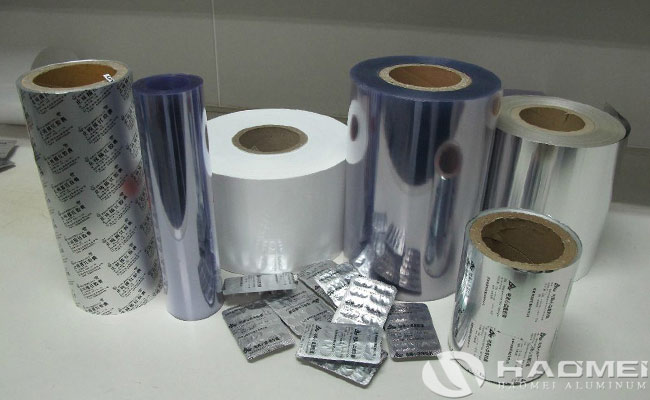Categories
- News From Haomei (308)
Aluminum foil for blister lidding packaging is a famous application of pharmaceutical packaging aluminium foil. The covering material (also known as sealing material) of the pharmaceutical blister packaging machine is basically aluminum foil, called aluminum foil for pharmaceutical blister packaging, which is required to be non-toxic, corrosion-resistant, impermeable, heat-resistant, moisture-proof, light-blocking and autoclavable performance. At present, the lidding materials of blister packaging are developing in the direction of diversified use, diversified functions, environmental protection, special protection and anti-counterfeiting.
Blister packaging is mainly made of polyvinyl chloride sheet (PVC) and 0.02mm thick aluminum foil for blister lidding packaging. Compared with traditional paper bags, glass bottles and other packaging, blister packaging has the advantages of moisture-proof, easy to carry, safety and hygiene. The main performance and testing indicators of aluminum blister lidding foil are: width and thickness, number of pinholes, coating amount of adhesive, heat sealing strength of adhesive layer, adhesion of protective layer, heat resistance of protective layer, rupture strength, abnormal toxicity, etc. The guarantee of these indicators makes blister packaging aluminum foil have good barrier properties, hygiene, heat sealing and mechanical strength.

Aluminum foil structure for blister packaging: OP protective layer, AL aluminum foil substrate, VC adhesive layer.
Aluminum foil for blister lidding packaging: 8011 aluminum foil, 8021 aluminum foil, the thickness is 0.025-0.08mm.
The larger the blisters, the thicker the aluminum foil. In addition to the necessary shading and barrier properties, it also has unique puncture properties, clean oil removal, and easy printing. 8011 aluminum foil is sufficient to meet all the above requirements, so it is widely used in the pharmaceutical packaging industry, and is usually used as an inner packaging material that is in direct contact with pharmaceuticals.